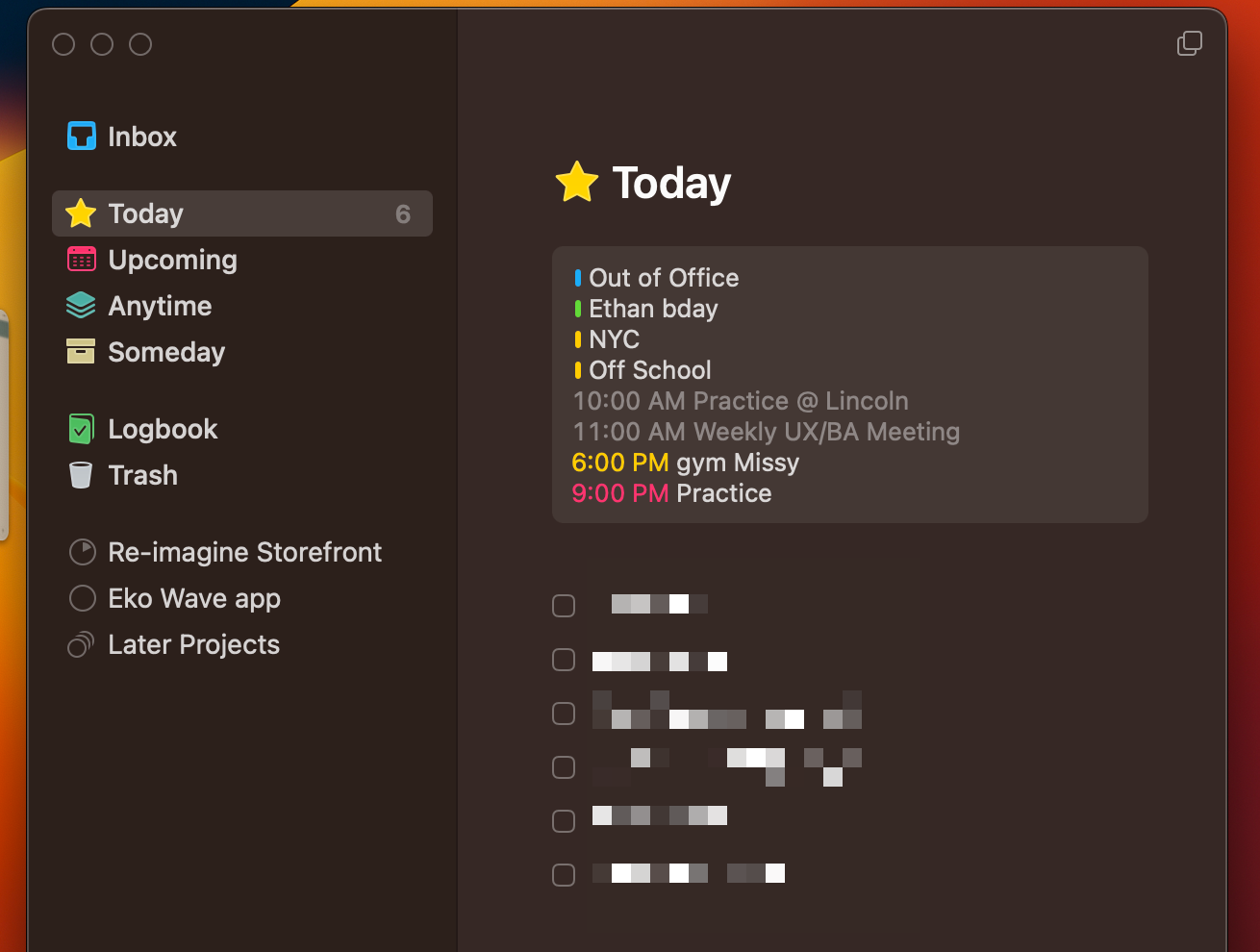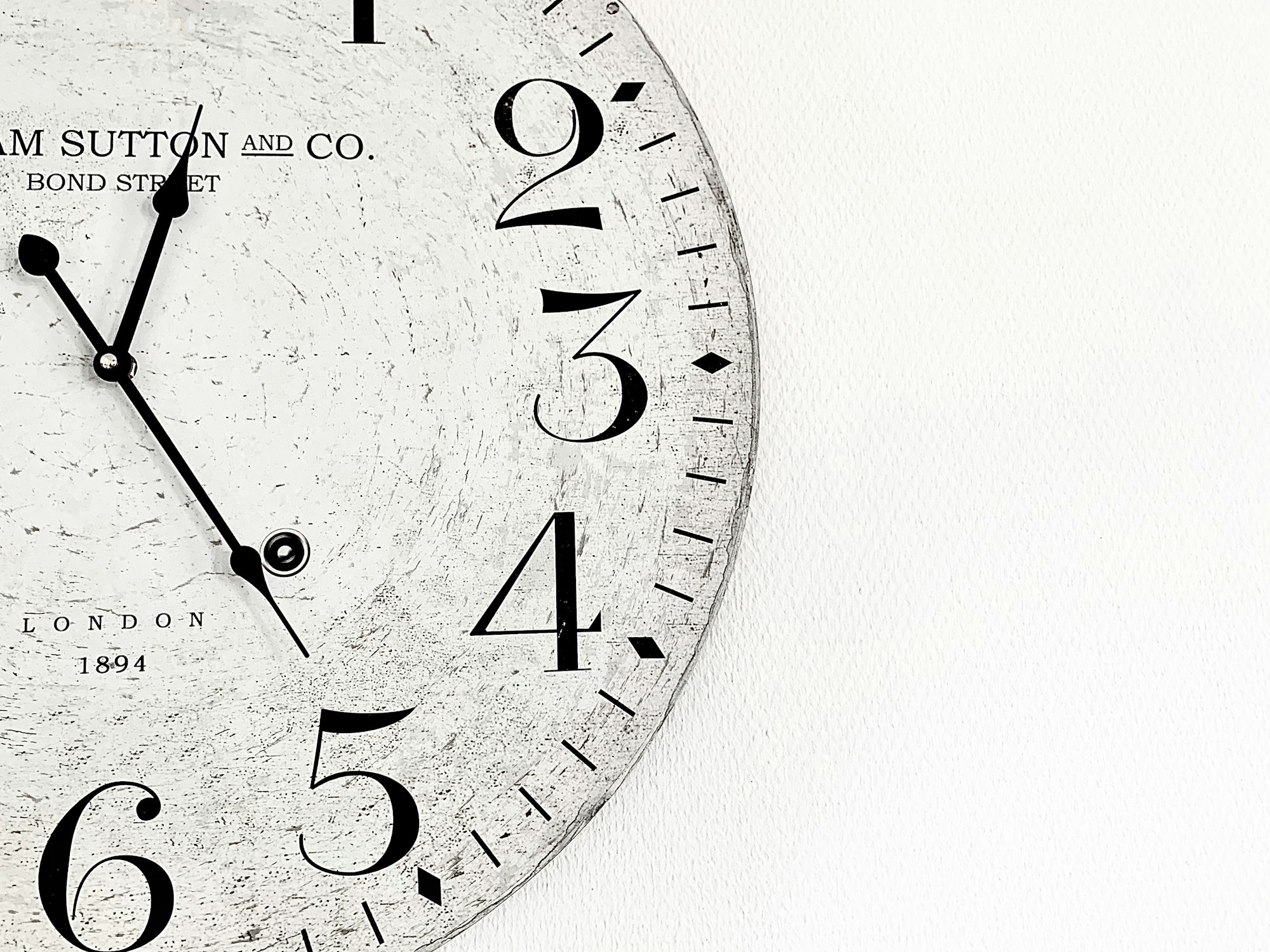I recently finished reading Four Thousand Weeks by Oliver Burkeman and I have to say, it was the most impactful "productivity" book I've ever read and definitely the most important book I've read this year. I think it spoke to me, not only because I've been a "productivity geek" for the last 15-20 years, but also because I can relate to and understand the Buddhist concepts he uses throughout the book.
Like all productivity geeks, I've spent so much time refining workflows, trying apps, optimizing my time, and reading about hacks and systems... and, after reading this book, I now feel like it was mainly wasted time. Because when I look back, these changes/improvements/hacks/whatever only provided minor, temporary improvements. Tasks and busyness never stopped filling in the recently vacated space afforded by checking off tasks and optimizing my calendar. It all seems so foolish now.
Since finishing the book, I've been wrestling with what these ideas mean for my life. To help me formalize a plan, I figured the best way to explore the ideas and spark more conversation would be to write a blog post.
Making Hard Choices
One of the main concepts in the book is making hard choices. The first step is to stop pretending you can get everything done. Rather than keeping a bucket list or trying to prioritize everything you've ever wanted or needed to do, Burkeman recommends using creative neglect, which is basically a process to figure out what you won't do. Some basics of that process:
1. Pay yourself first - Similar to putting a regular, small amount of money in savings before you do anything else, the idea is to do SOMETHING today regardless how small versus waiting for time. Time has a funny way of never cooperating otherwise.
2. Limit work in progress - We tend to commit to too much when we feel the pain of our finitude, but too many projects means none ever get done. For example, only have two active project slots and only start a new one when you finish or drop one.
3. Resist middling priorities - Burkeman shared Warren Buffet's idea for prioritizing life: make a list of the top 25 things you want out of life, then arrange them in order of importance. The top 5 is where you should organize your time. The remaining 20 are things to avoid at all costs. Those other 20 have insufficient importance, yet they are interesting enough to distract.
Burkeman stressed that making hard choices in turn elevates the importance and value you get from the things you DO actually chose. Rather than doing a lot and not valuing any of it fully, he implores us to have a tighter focus to really value life.
On Settling
Related to making hard choices, is the idea of settling. One of the perceived downsides of making a choice is the thought that you are settling and giving up future opportunities — potentially much better opportunities. But Burkeman says settling isn't inherently bad — it's simply making a choice. But not settling is a choice too. And given the finitude of life, it isn't necessarily a better choice.
When making a choice, it can be beneficial to go “all in” and give up on the other options. According to studies, people tend to be happier when they choose in a relatively irreversible way versus living life keeping alive the fantasy of “what could have been”. This “Joy of Missing Out” is the recognition that renouncing alternatives makes the actual choice more meaningful. When you can't fall back on other choices, anxiety tends to fall away and produce a calming feeling – there’s only one option: move forward.
Boredom
Burkeman says boredom is the intense, unpleasant reaction to your realization of lack of control. It’s how you deal with something you don't want to do, as you feel the finite nature of your life. This manifests through procrastination and distraction.
The problem with most productivity recommendations is they don’t don't address the bordeom/distraction urge itself. For example, having a hard time focusing on a conversation isn't because you are constantly checking your phone underneath the table. Checking your phone is what you do because conversations are hard and take a lot of effort: patience, emotional investment, surrender, and they could potentially hurt. The phone is naturally more pleasant and easy to deal with in the moment.
The best way to beat boredom and monotony is not to fight against it, but give in and and accept the reality of the situation. The only way out is through — sit with the uncomfortable feelings, acknowledge the feelings, and decide to move forward.
Patience
Patience is required to sit through boredom, as well as to make hard choices and see them through. Burkeman provided these three tips for getting better at patience:
1. Develop a taste for having problems: we have a fantasy of someday having no problems at all. But a life with no problems, is a life without living. Problems are simply something you need to address in your life. Life is engaging with problems and that engagement provides meaningful existence.
2. Practice radical incrementalism: focus on doing smaller chunks every day versus doing a lot in the short term to prevent burnout and procrastination. It is also easier to build into a daily thing you do. Set aside time and then stop when your time is up. The urge to push on involves feelings of impatience, not being “productive.”
3. Originality resides on the far side of unoriginality: have patience with the initial trial and error phase, the learning phase, the “slog”… this will eventually get you to a breakthrough. If you always pursue the unconventional from the start, you deny yourself the possibility of experiencing the richer forms of uniqueness that are reserved for those that have patience with the path. Things take the time they take.
Ten Ideas for Implementing
Burkeman ends the book with ten ideas to help you live life fully in the moment through meaningful choices:
1. Fixed volume approach to productivity - tough choices are inevitable: focus on making them mindfully and well. He recommends two lists: “Open” (everything on your plate) and “Closed” (a fixed number of entries - 10 at most - then only add new items if your list is under ten.) An “On Hold” list is OK too. In addition, set a fixed time boundary for daily work.
2. Serialize - focus on one project at a time or at least one work and one non-work project. Work until completion then move on to the next.
3. Decide in advance what to fail at - our time and energy is finite, so planning in advance what is OK to fail or be mediocre at allows you to reduce anxiety of trying to do everything.
4. Focus on what you've completed, not just what's left to complete versus starting each day fresh in productivity debt. Create a Done list and fill it out each day. Anything counts.
5. Consolidate your caring – society and media operates on enticing you to care about everything. Pick your battles and focus.
6. Embrace boring and single purpose technology – make your devices as boring as possible. Make it a tool vs a toy.
7. Seek out novelty in the mundane – life gets routinized and that is what makes time feel like it passes so quickly. Childhood is filled with novelty so it feels like it lasts forever. Pay more attention to each moment and plunge more deeply into each moment you have. Meditation helps, but also taking unplanned walks, new routes, photography, or bird watching, anything that draws more attention to what you are doing in the moment.
8. Be a researcher in relationships – when you are bored in a moment with someone else, turn to curiosity without any plan or goal.
9. Cultivate instantaneous generosity - act on the impulse to give money, send a nice message, give someone a call, or simply be nice to someone. Only generosity that counts is the one you do. Generous action also increases happiness.
10. Practice doing nothing – if you can't sit with doing nothing, you will feel like you need to fill every moment and make poor choices about your time. Resist the urge to manipulate your experience or people around you. Meditation can help.
The Plan
In terms of my life, I had been using Ultimate Brain by Thomas Frank -- a Notion system he developed as his take on task management and Tiago Forte's Building a Second Brain. It's a well-built, well thought out template which I found useful, though I always had the thought that it was a little too complex for long term sustainability.
With that and a "fixed volume" in mind, I immediately thought of the beauty and simplicity of Things. How I see a simple setup in Things to match Burkeman’s recommendations:
- Today: his “Closed” view. Not only does it have a calendar view, but there's a count displayed so I can easily limit to 10 tasks as most. And, if things don't get completed the roll over to the next day automatically, so I can assess them again and possibly complete the next day.
- Anytime: his “Open” view. Everything is listed here and you can manually re-order the list to give a general sense of hierarchy.
- Someday: his “On Hold” view. A place to put things I don't plan on working on now, including projects
- Projects: I will keep 1 personal, 1 work project as active and visible by default. The rest goes into Someday and those show as Future Projects.
- Logbook: fills the focus on what you've completed recommendation. You can easily see a historical record of what you've done.

Things also has the benefit of repeating tasks (Notion doesn't fully have this yet) and an Inbox, which is a good place to put all incoming items so I can review them at a later time. Beyond that, I'm not using Areas or Tags -- this will force me to make choices each day, which is a key part of Burkeman's ideas.
Beyond that, my next step is to do some of his other recommendations:
- the Warren Buffet priorities ranking
- simplify my devices to make them more of a tool than toy
- consolidate my caring - I plan to do a thorough audit of my RSS and social media feeds to amplify the things I truly care about and eliminate the rest
(I will follow up in future posts as I work through each of these.)
In the end, I can’t recommend this book highly enough — if any of this sounds interesting, it’s definitely worth the read. If you have already read it and put any of this into practice, please do share!

